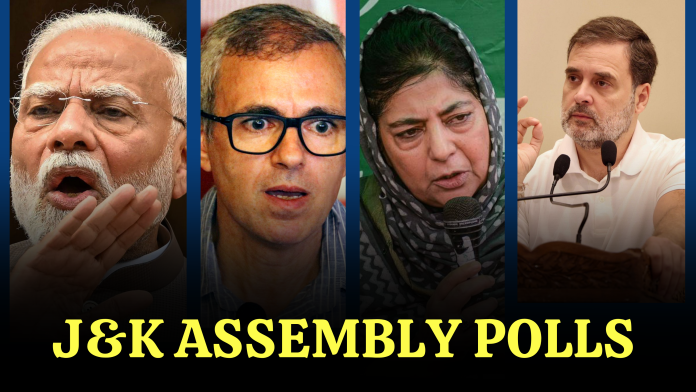Amogh Rohmetra
JAMMU, Aug 28: Out of 65 candidates fielded by Bharatiya Janata Party, Congress, National Conference and People’s Democratic Party in the first phase, only four are women. In other words, 94 per cent of candidates from these four dominant players are men, sowing seeds for lack of women representation in the newly elected Assembly.
Follow the Daily Excelsior channel on WhatsApp
Notably, this Assembly election is the first since the parliament passed the Women Reservation Bill last year, which sought to give 33 per cent reservation to women in the Parliament and State Assemblies. At the time, NC’s Omar Abdullah and PDP’s Mehbooba Mufti welcomed the bill with open arms. Congress and BJP were busy claiming ownership of the bill, earlier brought to the Parliament in 2010 under the UPA Government.
However, all four parties are on the backfoot when it comes to actually giving representation to women in the first phase. The National Conference has fielded two women-former Minister Sakina Ittoo (D.H. Pora) and District Development Council (DDC) Kishtwar chairperson Pooja Thakur (Padder-Nagseni)-out of its 18 candidates. PDP, on the other hand, despite having a woman at the helm of party affairs, has only fielded one woman candidate out of 22 candidates, in Iltija Mufti (Srigufwara-Bijbehara). Iltija is the daughter of former CM Mehbooba Mufti.
In BJP’s list of 16, the sole female candidate is Shagun Parihar (Kishtwar), daughter of Ajit Parihar, who was killed in a terror attack. Congress, on the other hand, has failed to field any woman candidate on its nine seats.
The condition in the other mainstream political parties is not any better, indicating why women have found minimal representation in the Jammu and Kashmir Assembly over the years. Ghulam Nabi Azad’s Democratic Progressive Azad Party (DPAP), Altaf Bukhari’s Apni Party, and Sajjad Lone’s People’s Conference have fielded 11, 13, and one candidate, respectively, in phase 1. Yet, out of these 25 candidates, only one is a woman, fielded by DPAP from Inderwal, Fatima Begum, according to Election Commission of India data.
Voting for the first phase is set to be held on 18 September for a total of 24 seats across seven districts, including Shopian, Kulgam, Anantnag, Pulwama, Doda, Kishtwar and Ramban. Rest of the UT will vote on 25th September and 1st October, before counting takes place on 4th October.
The lack of women representation has been an issue in Jammu and Kashmir for long. A look at Assembly segments in the districts going to polls in the first phase has a story to tell. Back in 2014 Assembly polls, not even a single woman elected representative from these seven districts was able to make it to the Assembly. Prior to delimitation, these districts accounted for 22 seats, two less than the current tally.
Six years earlier, in 2008, things were slightly better when at least two women MLAs were elected on these 22 seats-Mehbooba Mufti from Wachi in Shopian and Sakina Ittoo from Noorabad in Kulgam. According to the Election Commission of India, 48.9% of electors in the current Assembly election are women, which means nearly every second voter is a female.


